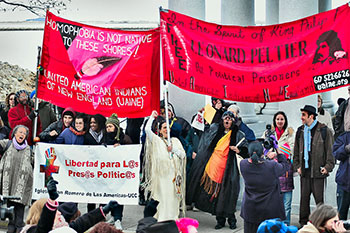Day of Mourning: ‘It’s time for justice!’
By
Frank Neisser
Plymouth, Mass.
Published Dec 3, 2008 3:48 PM
Hundreds of people participated in the 39th National Day of Mourning here,
organized by the United American Indians of New England, on Nov. 27. The event
is held on every U.S. “Thanksgiving” Day to tell the truth about
that myth and uncover the real experience of Native peoples in this area since
1492.
|
On “Thanksgiving” Day, marchers in Plymouth,
Mass., united many
struggles.
WW photos: Liz Green
|
After an opening spiritual ceremony, Moonanum James, co-leader of UAINE,
related the history of the National Day of Mourning. Moonanum James is the son
of Wamsutta Frank James, who founded UAINE and initiated the first National Day
of Mourning in 1970.
An Aquinnah Wampanoag elder, Wamsutta had been invited to present a speech at a
state banquet on the occasion of the 350th anniversary of the landing of the
Pilgrims. He wrote a speech that spoke the truth about the experience of Native
people after the arrival of the Pilgrims. When the banquet organizers rejected
Wamsutta’s speech and tried to substitute one of their own, Wamsutta
refused. He and hundreds of other Native people and their supporters declared a
National Day of Mourning for Native Americans in Plymouth on
“Thanksgiving” Day.
|
UAINE co-leader
Mahtowin Munro
(Lakota) listens
as
Bert Waters reads
Leonard Peltier's
message.
|
In his opening talk, Moonanum pointed out that the conditions of terrible
racism and poverty afflicting Native people still persist. He noted that the
election of an African-American president would not be enough to eliminate
racism, and that substandard housing, choosing between heating and eating,
dying from treatable diseases, lack of educational opportunities, Bureau of
Indian Affairs corruption, and government refusal to restore power to Native
Nations all still afflict Native peoples today.
Moonanum appealed to President-elect Barack Obama to stop giving
taxpayers’ money to brokers and bankers and instead use the money to
build housing, clinics, put books in schools and food in people’s
bellies, and to honor the treaties with Native Nations. He also called on Obama
to serve justice and free Leonard Peltier.
Next the rally was addressed by Juan Gonzalez, speaking for the Council of Maya
Elders. He spoke of the history of all Native peoples’ struggles to keep
their way of life alive. He said it was good to have a Black brother in the
White House, but that his peoples’ struggle was not over, and would not
be over until no one was called “illegal,” until racism, sexism,
homophobia and war had come to an end, until this government recognized
sovereign Native Nations, and until Leonard Peltier was free.
Native political prisoner Leonard Peltier sent a message to the 39th National
Day of Mourning that was read by Bert Waters (Wampanoag). Peltier is now 64
years old and in his 33rd year of incarceration, even though under federal law
he should have been paroled after 30 years. Peltier called for renewed
organizing for his defense. He indicated that he saw in Obama’s election
perhaps his last chance for freedom.
The rally was concluded by Elena Ortiz of Ohkay Owingeh in Northern New Mexico.
Elena described how a continuum of peoples’ struggles, from Rosa Parks to
the occupations of Alcatraz and Wounded Knee, had contributed to the election
of an African American as president, but that now it is time to show him what
we need and want. She said this is not the time to trust in Washington but
rather to stay in the streets to see that Obama does what’s necessary,
that this is not the end of the road but the first step. Ortiz also gave a
moving account of her visit to the Palestine 48 conference in East Jerusalem
this past spring, and how the struggle of the people native to the area, the
Palestinians, was the same as that of Native people here.
The gathering then proceeded to march through Plymouth. Marchers stopped at
Plymouth Rock, where Moonanum described an attack on the National Day of
Mourning by police in 1997. He explained that the same Michael Sullivan,
Plymouth district attorney who prosecuted the 25 people arrested in 1997, is
now a U.S. attorney and responsible for the FBI entrapment and harassment of
elected leaders of color, including Boston City Councilor Chuck Turner.
Moonanum called on everyone to come out in support of Turner.
The march also stopped at Post Office Square where, for 20 years, the Pilgrim
settlers displayed the head of Metacomet, leader of the King Phillip war, on a
spike. A plaque commemorating and explaining that history is now at the site,
part of a settlement reached by UAINE in the Plymouth 25 case.
The march was followed by a pot-luck social.
Articles copyright 1995-2012 Workers World.
Verbatim copying and distribution of this entire article is permitted in any medium without royalty provided this notice is preserved.
Workers World, 55 W. 17 St., NY, NY 10011
Email:
[email protected]
Subscribe
[email protected]
Support independent news
DONATE


